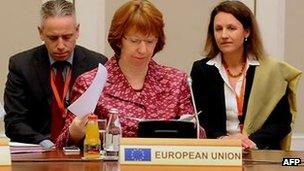Iran nuclear talks 'yield little progress'
- Published

Iran has failed to deliver a "clear and concrete response" to a proposal aimed at ending deadlock over its nuclear programme, a Western diplomat has said.
Tehran said it had offered "specific plans" at the opening of the talks with world powers in Kazakhstan.
But the diplomat there said they were a "reworking" of proposals rejected at last year's talks in Russia.
Iran insists its nuclear programme is purely civilian, but world powers suspect it has a military intent.
The Iranian chief negotiator, Saeed Jalili, strongly defended its programme ahead of the talks, saying the global community must accept Tehran's right to enrich uranium.
The talks have now ended for the day and are expected to resume again on Saturday.
'Practical solution'
Mr Jalili opened the talks in Almaty on Friday morning by presenting "specific plans and proposals for starting a new round of co-operation" between Iran and Britain, China, France, Russia, the United States and Germany (P5+1), his deputy Ali Bagheri said.
But a Western diplomat, who did not want to be named, said that the P5+1 was "somewhat puzzled by the Iranians' characterisation of what they presented" at the morning session.
"There has not yet been a clear and concrete response to the... proposal" made by the P5+1 at their most recent talks, in February, in Almaty, the diplomat said.
"There were some interesting but not fully explained general comments on our ideas. It was mainly a reworking of what they said in Moscow."
Saeed Jalili told an audience at Almaty university on Thursday: "We think our talks... can go forward with one word. That is the acceptance of the rights of Iran, particularly the right to enrichment."
"We are talking about peaceful nuclear energy," he stressed, accusing "a handful of countries" of trying "to deny this right to others".
UN Secretary General Ban Ki-moon told reporters in Madrid on Thursday he hoped for "very meaningful progress" from the negotiations, urging the Iranians to prove their programme was for peaceful purposes.
At the previous round of talks in Kazakhstan in February, the world powers tried to push Tehran to halt production and stockpiling of uranium enriched to 20% - a step away from achieving a nuclear weapons capability.
The P5+1 also demanded Iran shut down the Fordo underground enrichment facility.
In return the world powers suggested easing tough economic sanctions against Iran.
Several rounds of sanctions have squeezed Iran's economy, with oil revenue slashed, the currency nose-diving in value and unemployment growing.
But significant differences reportedly remain on how far both sides are willing to go to reach a mutually accepted compromise.
In March, US President Barack Obama said he had offered Iran a "practical solution" if it truly sought peaceful nuclear capabilities rather than weapons.
He urged the country to take "immediate and meaningful steps" to reduce tension with the international community.
Meanwhile, Israel has warned that it will stop Iran's programme militarily if other means fail.